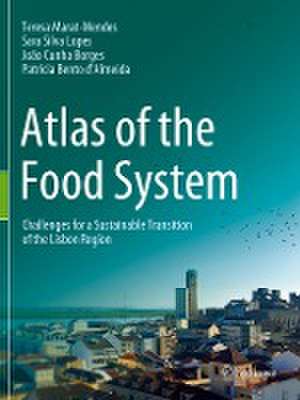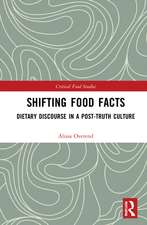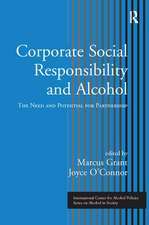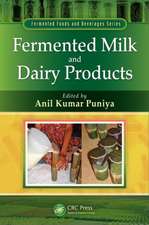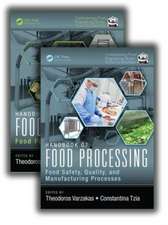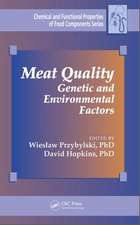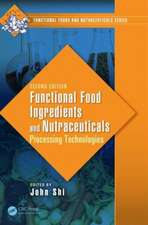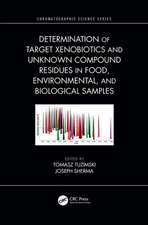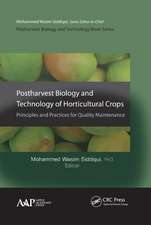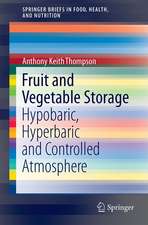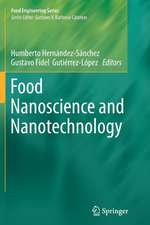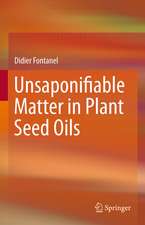Atlas of the Food System: Challenges for a Sustainable Transition of the Lisbon Region
Autor Teresa Marat-Mendes, Sara Silva Lopes, João Cunha Borges, Patrícia Bento d'Almeidaen Limba Engleză Paperback – 10 iun 2023
The atlas results from an exhaustive survey and research work conducted in Lisbon Metropolitan Area for a research project, SPLACH – Spatial Planning for Change, for the past 3 years, in terms of the analysis of its Food System and Urban Planning, aiming to inform the delineation of planning strategies towards a sustainable urban environment. It is an important reference for planners, architects, planning and architecture students as well as municipal technicians and the general public, as it provides a refreshing and useful source of information to support further readings about the food system and its relations to urban planning instruments and urban form solutions. Furthermore, it builds a contemporary reading about possible solutions to promote a sustainable transition of the current food systems, while enhancing the strategic role of planning and urban form.
| Toate formatele și edițiile | Preț | Express |
|---|---|---|
| Paperback (1) | 1205.73 lei 38-44 zile | |
| Springer International Publishing – 10 iun 2023 | 1205.73 lei 38-44 zile | |
| Hardback (1) | 1400.35 lei 3-5 săpt. | |
| Springer International Publishing – 10 iun 2022 | 1400.35 lei 3-5 săpt. |
Preț: 1205.73 lei
Preț vechi: 1586.48 lei
-24% Nou
Puncte Express: 1809
Preț estimativ în valută:
230.71€ • 251.40$ • 194.41£
230.71€ • 251.40$ • 194.41£
Carte tipărită la comandă
Livrare economică 19-25 aprilie
Preluare comenzi: 021 569.72.76
Specificații
ISBN-13: 9783030948351
ISBN-10: 3030948358
Pagini: 314
Ilustrații: LVII, 314 p. 305 illus., 276 illus. in color.
Dimensiuni: 210 x 280 mm
Ediția:1st ed. 2022
Editura: Springer International Publishing
Colecția Springer
Locul publicării:Cham, Switzerland
ISBN-10: 3030948358
Pagini: 314
Ilustrații: LVII, 314 p. 305 illus., 276 illus. in color.
Dimensiuni: 210 x 280 mm
Ediția:1st ed. 2022
Editura: Springer International Publishing
Colecția Springer
Locul publicării:Cham, Switzerland
Cuprins
1. The emergence of spatial planning policy in 20th century Portugal.- 2. Change of paradigm: a modern program.- 3. The democratic planning policy.- 4. The rural habitat and architectural imagination.- 5. On the road.- 6. The Food System, a portrait of transformations.- 7. Urban agriculture from a historical perspective.- 8. A survey of Urban Agriculture in the Lisbon Region.- 9. Putting the food system into perspective: a case-study from Lisbon to Vila Franca de Xira.
Notă biografică
Teresa Marat-Mendes is an Architect and Associated Professor with Habilitation in Architecture at the Department of Architecture and Urbanism of Iscte- Instituto Universitário de Lisboa. She is a senior researcher at DINÂMIA’CET Research Center, where she coordinated the research teams for Project ‘MEMO- Evolution of the Lisbon Metropolitan Area Metabolism. Lessons towards a Sustainable Urban Future’ and Project ‘SPLACH-Spatial Planning for Change’. She was the coordinator of the Atlas of Water and Agriculture, which resulted from the research Project MEMO and was also the coordinator of the present Atlas of the Food System, which resulted from Project SPLACH. She was awarded Women in Science in 2019, a recognition attributed by Ciência Viva for those women scientists in Portugal, whose outstanding work has been central to the national progress in science and in national technology recorded in the last decades. She is a member of the International Seminar on Urban Form (ISUF) Council and the former president and co-founder of the Portuguese Language Network on Urban Morphology (PNUM).
Sara Silva Lopes is an Architect and Research Assistant at DINÂMIA’CET, the Research Centre for Socioeconomic and Territorial Studies of Iscte - Instituto Universitário de Lisbon. She was a researcher for Project SPLACH - Spatial Planning for Change, where she was intensevley involved on the survey of Lisbon Metropolitan Urban Agriculture and of its Food System. At the present, she is developing her doctoral studies research ‘Housing in Democracy: Typo-morphological and socio-spatial perspective of housing policies in the Lisbon metropolitan Area’. Her research interests focus on the studies of urban morphology, spatial planning instruments, public policies, and the right to the city and to housing.
João Cunha Borges is an architect and a Research Assistant at DINÂMIA’CET, Iscte - Instituto Universitário de Lisboa. He was a researcher for Project SPLACH- Spatial Planning for Change and was intensely involved on the survey of Lisbon Metropolitan Urban Agriculture and of its Food System. He wrote a dissertation on Aldo Van Eyck and Alison and Peter Smithson, titled ‘The dissolution of the modern complex’. At present he is developing his doctoral studies with the research project ‘Social Urban Forms at the Millennial City Scene - Housing and urban interventions from England and Portugal’. His research seeks to contribute with a multidisciplinary approach to architectural theory, including Urban Planning History and Sustainability, Aesthetics, Anthropology of Space, and Popular Culture.
Patrícia Bento d’Almeida is an Architect and a Researcher at DINÂMIA’CET–IUL, Iscte-Intituto Universitário de Lisboa. She holds a Master and a Ph.D. degree in History of Art from Universidade Nova de Lisboa. Shewas a researcher for Project SPLACH- Spatial Planning for Change, contributing to the analysis of 20th century Portuguese Architecture and Urban Planning History and the photographic survey of the food system of Lisbon Metropolitan Area. At current she is developing a post-doctoral research ‘LNEC, the Portuguese Laboratory of Civil Engineering, and the history of research in Arquitectura’. She was the curator of the exhibition Victor Palla and Bento d’Almeida, present at Centro Cultural de Belém in 2017.
Sara Silva Lopes is an Architect and Research Assistant at DINÂMIA’CET, the Research Centre for Socioeconomic and Territorial Studies of Iscte - Instituto Universitário de Lisbon. She was a researcher for Project SPLACH - Spatial Planning for Change, where she was intensevley involved on the survey of Lisbon Metropolitan Urban Agriculture and of its Food System. At the present, she is developing her doctoral studies research ‘Housing in Democracy: Typo-morphological and socio-spatial perspective of housing policies in the Lisbon metropolitan Area’. Her research interests focus on the studies of urban morphology, spatial planning instruments, public policies, and the right to the city and to housing.
João Cunha Borges is an architect and a Research Assistant at DINÂMIA’CET, Iscte - Instituto Universitário de Lisboa. He was a researcher for Project SPLACH- Spatial Planning for Change and was intensely involved on the survey of Lisbon Metropolitan Urban Agriculture and of its Food System. He wrote a dissertation on Aldo Van Eyck and Alison and Peter Smithson, titled ‘The dissolution of the modern complex’. At present he is developing his doctoral studies with the research project ‘Social Urban Forms at the Millennial City Scene - Housing and urban interventions from England and Portugal’. His research seeks to contribute with a multidisciplinary approach to architectural theory, including Urban Planning History and Sustainability, Aesthetics, Anthropology of Space, and Popular Culture.
Patrícia Bento d’Almeida is an Architect and a Researcher at DINÂMIA’CET–IUL, Iscte-Intituto Universitário de Lisboa. She holds a Master and a Ph.D. degree in History of Art from Universidade Nova de Lisboa. Shewas a researcher for Project SPLACH- Spatial Planning for Change, contributing to the analysis of 20th century Portuguese Architecture and Urban Planning History and the photographic survey of the food system of Lisbon Metropolitan Area. At current she is developing a post-doctoral research ‘LNEC, the Portuguese Laboratory of Civil Engineering, and the history of research in Arquitectura’. She was the curator of the exhibition Victor Palla and Bento d’Almeida, present at Centro Cultural de Belém in 2017.
Textul de pe ultima copertă
This book is a visual guide to the territorial dynamics operating within a territory. The reading of such dynamics is fundamental in understanding the role of food in cities. This atlas provides a refreshing approach to the study of the city and of its territory, expanded from the perspective of the food system. This book illustrates the impacts of urban planning options on the function of the contemporary Food System of the Lisbon Region, while disclosing its associated urban form solutions. It provides a possible methodology for the reading of the food system based on an analysis of planning instruments and their morphological outcomes, both in the territory but also on the various built forms which have resulted over time. A key focus of the atlas is exploring how planning has regulated the evolution of the Lisbon Region since the 20th century and its implications on the food system.
The atlas results from an exhaustive survey and research work conducted inLisbon Metropolitan Area for a research project, SPLACH – Spatial Planning for Change, for the past 3 years, in terms of the analysis of its Food System and Urban Planning, aiming to inform the delineation of planning strategies towards a sustainable urban environment. It is an important reference for planners, architects, planning and architecture students as well as municipal technicians and the general public, as it provides a refreshing and useful source of information to support further readings about the food system and its relations to urban planning instruments and urban form solutions. Furthermore, it builds a contemporary reading about possible solutions to promote a sustainable transition of the current food systems, while enhancing the strategic role of planning and urban form.
The atlas results from an exhaustive survey and research work conducted inLisbon Metropolitan Area for a research project, SPLACH – Spatial Planning for Change, for the past 3 years, in terms of the analysis of its Food System and Urban Planning, aiming to inform the delineation of planning strategies towards a sustainable urban environment. It is an important reference for planners, architects, planning and architecture students as well as municipal technicians and the general public, as it provides a refreshing and useful source of information to support further readings about the food system and its relations to urban planning instruments and urban form solutions. Furthermore, it builds a contemporary reading about possible solutions to promote a sustainable transition of the current food systems, while enhancing the strategic role of planning and urban form.
Caracteristici
Original survey on urban agriculture Analysis of unknown or quasi-unknown historical urban plans Spatial analysis of the food system in the Lisbon Region
